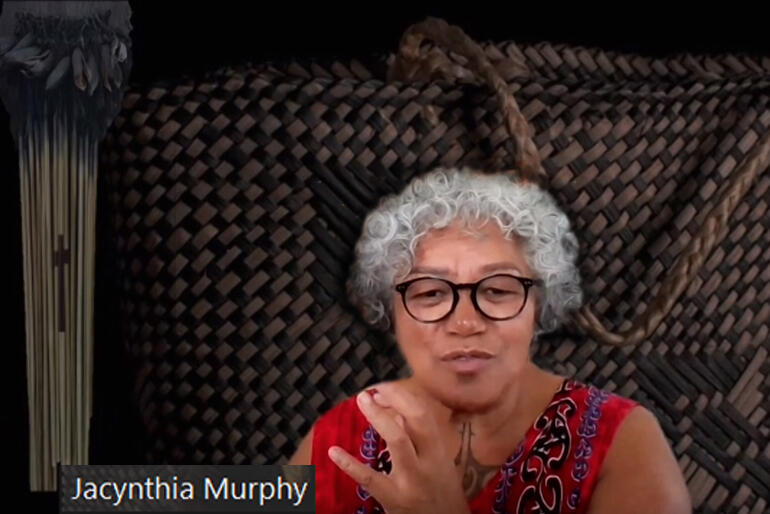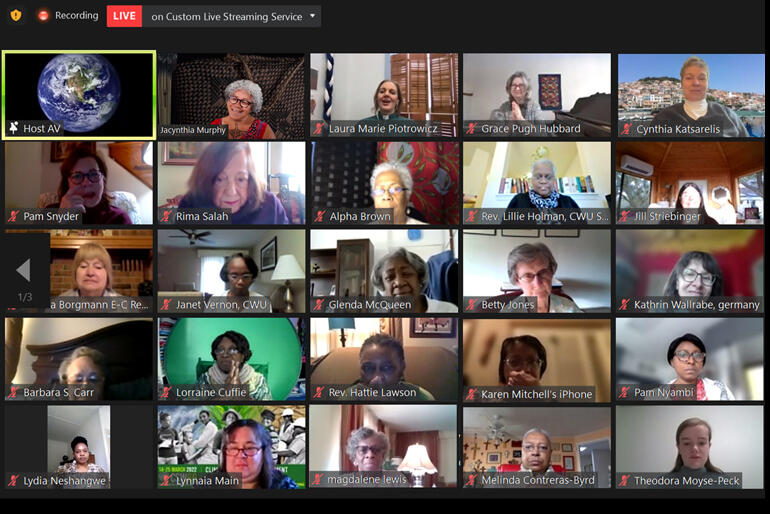

Rev Jacynthia Murphy reports that she has emerged inspired and enlightened after attending 23 sessions of the UN Commission on the Status of Women(UNCSW) NGO programme as part of the Anglican Communion delegation.
Rev Jacynthia Murphy, who is Tuia General Synod Office support manager and a priest Tamaki makaurau attended UNCSW as part of the ten-member Anglican Communion delegation which was selected by Communion staff. AS part of her involvement Jacynthia presented an indigenous perspective on “Gaps and challenges in climate action” in line with the UNCSW theme of “Achieving gender equality and empowerment in the context of climate change.”
Jacynthia took part alongside Green Anglicans’ Rev Rachel Mash, Brazilian Bishop Rt Rev Marinez Rosa dos Santos Bassotto, the Rev Christine Benoit, Martha Spence, Florence Anyango Oduor, Anglican Communion Director for Gender Justice Mandy Marshall, Anglican representative to the UN Jack Palmer-White, Rev Rachel Taber-Hamilton and Clagel Nellas.
This year, pandemic restrictions meant that only a few UNCSW delegates gathered in the New York UN headquarters, while at the same time thousands joined the conference and its multitude of ‘side-events’ online.
Throughout the UNCSW Jacynthia was struck by the confidence and strength of the women presenting on the theme, whose powerful calls for change came from firsthand experience in women’s organisations working to empower women and girls and protect Mother Earth.
“There was a strong call coming from women all around the world, that now is the time for us to shift towards nurturing mother Earth.” she said.
“There was a recognition that that’s not the way round it is supposed to be – mother Earth should be nurturing us. But now she is hurting and so we have to shift our focus and become the ones looking after her.”
Jacnythia reports that women from very different contexts all shared the call to bring more holistic values into conversations about land, people and resources.
“Women everywhere are seeking transformation based on values of nurture and lifegiving. They are becoming more confident as advocates of the Earth, and their message is that economics can’t be everything.”
“In my presentation I said we urgently need a deeper understanding of what we value, and especially listen to indigenous peoples way of understanding Mother Earth, rather than reducing people and land and resources down to sources of profit.”
Amongst the 23 sessions she attended, the stand out conversations for Jacynthia were ones where women shared their practical strategies for social and cultural change. A shared focus was how to improve the rights of women and thereby strengthen their ability to have a fair say in how to protect and care for Creation.
Jacynthia reports that “stand out” sessions of the UNCSW included:
Women and land rights in India – hearing from women’s NGOs who work to end the scandal of local customs that deny women the right to inherit or own land. “I was shocked that in both South America and India there are many places where daughters, wives and sisters cannot inherit or own land within their families,” said Jacynthia. “That denies them the ability to live by subsistence and leaves them exposed to poverty and hunger. At the same time it opens up their land for sale to high polluting industry.” This forum concluded that in many places the ability of women and indigenous people to own land control the use of its resources leads to environmental destruction.”
Native American land advocacy – sharing in the story of the struggle against the Standing Rock oil pipeline installation.“The indigenous advocates of the Earth at Standing Rock shared their grief that despite all their advocacy and all the support it gained, they haven’t been able to stop the pipeline.” The forum speakers also placed that Standing Rock story in the context of wider injustices against indigenous peoples, customs and traditions that protect and sustain the created order.
Climate and Gender justice in the Catholic Church This forum saw Catholic women rallying for equality in leadership and fair access to decision-making in their church as they work to counter climate damage.
“These women know their value and they know they are entitled to equal treatment in the Catholic Church – and they believe a more equitable church will be a Church that serves its purpose better, including improving its ability to care for the Earth.”
Women in the Pacific
Jacynthia was surprised to encounter Pacific feminism in the forum led by Pacific women. “Boy, these women were on fire – and I’ll tell you what, they’ve had enough!” Jacynthia reports that the Pacific speakers clearly called out the male politicians who had chosen the tack of corruption in an attempt to keep hold of their political power, even when it had been fairly won by a woman.
Gender equity and workplace bullying
This workshop analysed how gender-based bullying places limits on women’s agency and reduces their voices in many organisations and workplaces around the world. “Presenters explained how few women recognised that bullying affected their work. This forum looked at the impact of minor and serious bullying of women in workplaces including intimidation, insults, threats, dismissing of efforts, having credit taken for their (women's) professional work and excessive monitoring (especially of young women's work). Presenters specifically detailed how women had faced loss of paid hours or dismissal for challenging status quo values, structures or policies of domination and exploitation that undermined women and damaged the Earth.
Leading with heart This forum was a faith-based NGO action planning session on how to encourage women of faith to become community leaders in ecojustice. “We agreed that women of faith working to protect the Earth need a bigger part at the decision-making tables, at the landowner tables and at the policy tables. As well as getting more women in purple shirts, we need to challenge structures which only give voice to purple shirts.”
Rev Jacynthia Murphy will share her insights from the 2022 United Nations Commission on the Status of Women in more detail in an Anglican Women’s Studies Centre Virtual Theology chat on 19 May at 7pm. For more info or to request the Virtual theology Zoom link, contact AWSC Administrator Ceridwyn Parr at:anglicanwomenstudies@gmail.com

















Comments
Log in or create a user account to comment.